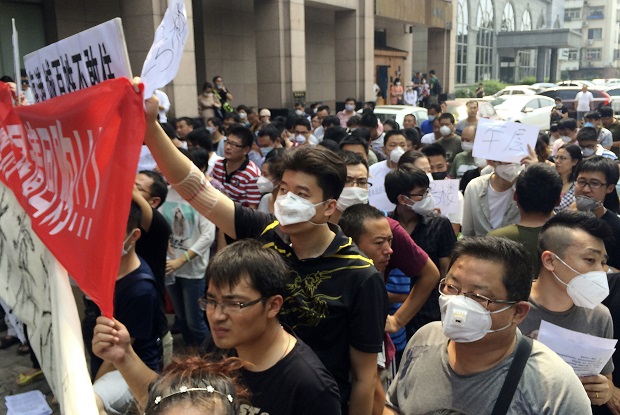
Residents, some wearing masks, hold banners and placards as they stage a protest outside a hotel where officials held daily media conferences in northeastern China’s Tianjin municipality Monday, Aug. 17, 2015. About a hundred people whose residences were damaged in the massive Tianjin blasts gathered Monday for a protest to demand compensation from the government. (Photo by Paul Traynor/AP)
TIANJIN, China — Firefighters, police and officials held a moment of silence Tuesday for victims of last week’s huge explosions at a warehouse in the Chinese port city of Tianjin that killed at least 114 people and left 70 others missing.
The ceremony, briefly shown live on national television, marks the sixth day after the disaster, the first observance in the 49-day traditional mourning cycle.
That follows an order issued by the Ministry of Industry and Information Technology for nationwide inspections to correct workplace safety irregularities. The ministry lamented the frequency of fatal workplace accidents and demanded a thorough inspection of all safety risks.
Prosecutors were also ordered to investigate possible dereliction of duty and abuse of power that may have contributed to Wednesday night’s blasts.
“We must thoroughly investigate (the incident) and hold accountable all those responsible,” state media quoted Premier Li Keqiang as saying. “We must give an answer for families of the victims, an answer for all residents of Tianjin, an answer for all Chinese people, and an answer for history.”
The blasts originated at a warehouse for hazardous material, where 700 tons of sodium cyanide — a toxic chemical that can form combustible substances on contact with water — was being stored in amounts that violated safety rules. That has prompted contamination fears and a major cleanup of a 3-kilometer (1.8-mile) -radius, cordoned-off area in the port city southeast of Beijing.
More than 40 different types of hazardous chemicals were being stored at the site with a total volume of about 3,000 tons, deputy national fire chief Niu Hueguang was quoted as saying on the China Fire Services’ official website.
That included 800 tons of ammonium nitrate, sometimes used in explosives, and about 500 tons of potassium nitrate, often used in rocket fuel and fireworks.
Chinese work safety rules require such storage facilities to be at least 1,000 meters (3,300 feet) away from residences, public buildings and highways. But online map searches show the Ruihai International Logistics warehouse was within 500 meters of both an expressway and a 100,000-square meter (1 million-square foot) apartment complex. Those apartments’ walls were singed and its windows were shattered, and all residents have been evacuated.
Some owners of the damaged residences have demanded compensation from the government.
“We victims demand: Government, buy back our houses,” said a banner carried by the residents outside the Tianjin hotel where officials have held daily news conferences about the disaster.
Tianjin officials have been hard-pressed to answer how the warehouse was allowed to operate in its location. Questions also have been raised about management of the warehouse, and the country’s top prosecuting office announced Sunday that it was setting up a team to investigate possible offenses related to the massive blasts, including dereliction of duty and abuse of power. Ruihai’s general manager is in a hospital under police watch.
Tianjin government officials said the blasts killed least 114 people, with 70 still missing, including 64 firefighters and six policemen.
On Monday, He Shushan, a deputy mayor, confirmed there was 700 tons of toxic sodium cyanide on the site at the time of the blasts, although authorities said there have not been any substantial leaks. Authorities also said they had sealed all waterways leading into the sea from the blast site and built retaining walls to prevent any runoff.
Sodium cyanide can form a flammable gas upon contact with water, and several hundred tons would be a clear violation of rules cited by state media that the warehouse could store no more than 10 tons at a time.
The ministry’s directive ordered government authorities at all levels to check whether companies within their jurisdictions that produce and store hazardous materials comply with safety regulations, including if they are a safe distance from residential areas and do not exceed storage limits.
The death toll includes at least 21 firefighters — making the disaster the deadliest for Chinese firefighters in more than six decades — and their toll could go much higher because 64 remain missing. About 1,000 firefighters responded to the disaster.
The Tianjin blasts are among the deadliest industrial accidents in China in recent years. In June 2013, a fire at a poultry plant in the northeastern province of Jilin killed 121 people. In August 2014, a dust explosion at a metal plant in the eastern province of Jiangsu left 97 people dead.
RELATED STORY:
Surviving firefighter recalls moment of horror in China tragedy